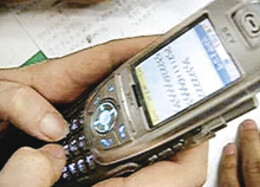hankyoreh
Links to other country sites 다른 나라 사이트 링크
Mobile phone bill controversy flares again

Controversy is brewing again between the government and the telecommunications industry on the one side, and consumer-led civic groups on the other, over whether the price of mobile-phone bills in South Korea is appropriate or not, when compared with the prices in other countries.
In the latest development in the debate, South Korean phone-bill data released via the Organisation for Economic Cooperation and Development’s (OECD) Communications Outlook was found to have been based on figures for SK Telecom’s bills for services to teenagers, one of the cheapest phone bill categories in the report. The report provides information on telecommunications performance and policies of its member nations.
So far, the government and SK Telecom, citing the OECD report, have rejected demands by civic groups and consumers to slash prices, claiming that mobile-phone bills in South Korea are cheaper than those in other OECD nations. Misrepresentation in the OECD data aside, Hong Kong’s telecommunications ministry and financial advisory company Merrill Lynch have categorized South Korea’s mobile-phone bills as being among the world’s most expensive, according to civic groups.
According to a statement released by the Ministry of Information and Communication, SK Telecom and the Green Consumers Network in Korea on July 25, the OECD compared SK Telecom’s less expensive mobile-phone bills, called “Ting100” and “Tingbuddy,” with bills in other OECD member nations when it conducted the survey in August last year. The two kinds of mobile-phone bills are cheaper than others because only teenagers under 19 are allowed to subscribe to the services.
Based on the OECD survey, the communications ministry and SK Telecom have argued that mobile-phone bills in South Korea are cheaper than those in foreign countries. In a public debate held in June and aimed at finding ways to ease household burdens on telecommunications spending, SK Telecom’s executive vice president Jeong Dae-cheol said, “According to a survey by the OECD, mobile-phone bills in South Korea are at 75.8 percent of the average found in other OECD nations. In addition, bills for text message services are the cheapest.” The debate was hosted by the pro-government Uri Party.
In response, civic groups said that mobile-phone bills in South Korea were more expensive, citing reports by Hong Kong’s telecommunications ministry and Merrill Lynch. Jeong Ung-hwi, a policy official at the Green Consumers Network in Korea, said that the ratio of telecommunications spending to household income between 1996 and 2004 in South Korea had topped a list of eight surveyed nations (the United States, Britain, Australia, Sweden, Japan, Singapore, Hong Kong and South Korea), citing a survey conducted by Hong Kong’s telecommunications ministry. In another report by Merrill Lynch, Jeon said that the average revenue per user in South Korea was ranked second after the United States. In addition, the ratio of operating profit to revenue per user in South Korea was ranked at one of the highest levels, Jeon said.
“The Ministry of Information and Communication and SK Telecom have lied to consumers, the National Assembly and the President,” Jeon said, calling for mobile operators to cut phone-bill prices.
A ministry official, who asked not to be named, admitted that his ministry knew that the OECD survey was based on SK Telecom’s bills for less expensive mobile-phone services. “It’s a fact that the ministry has cited the OECD survey without any further explanation,” the official said.
Please direct questions or comments to [englishhani@hani.co.kr]
Editorial・opinion
![[Column] Park Geun-hye déjà vu in Yoon Suk-yeol [Column] Park Geun-hye déjà vu in Yoon Suk-yeol](https://flexible.img.hani.co.kr/flexible/normal/500/300/imgdb/original/2024/0424/651713945113788.jpg) [Column] Park Geun-hye déjà vu in Yoon Suk-yeol
[Column] Park Geun-hye déjà vu in Yoon Suk-yeol![[Editorial] New weight of N. Korea’s nuclear threats makes dialogue all the more urgent [Editorial] New weight of N. Korea’s nuclear threats makes dialogue all the more urgent](https://flexible.img.hani.co.kr/flexible/normal/500/300/imgdb/original/2024/0424/7317139454662664.jpg) [Editorial] New weight of N. Korea’s nuclear threats makes dialogue all the more urgent
[Editorial] New weight of N. Korea’s nuclear threats makes dialogue all the more urgent- [Guest essay] The real reason Korea’s new right wants to dub Rhee a founding father
- [Column] ‘Choson’: Is it time we start referring to N. Korea in its own terms?
- [Editorial] Japan’s rewriting of history with Korea has gone too far
- [Column] The president’s questionable capacity for dialogue
- [Column] Are chaebol firms just pizza pies for families to divvy up as they please?
- [Column] Has Korea, too, crossed the Rubicon on China?
- [Correspondent’s column] In Japan’s alliance with US, echoes of its past alliances with UK
- [Editorial] Does Yoon think the Korean public is wrong?
Most viewed articles
- 1‘We must say no’: Seoul defense chief on Korean, USFK involvement in hypothetical Taiwan crisis
- 2N. Korean delegation’s trip to Iran shows how Pyongyang is leveraging ties with Moscow
- 346% of cases of violence against women in Korea perpetrated by intimate partner, study finds
- 4Amnesty notes ‘erosion’ of freedom of expression in Korea in annual human rights report
- 5‘Weddingflation’ breaks the bank for Korean couples-to-be
- 6[Column] Park Geun-hye déjà vu in Yoon Suk-yeol
- 7Will NewJeans end up collateral damage in internal feud at K-pop juggernaut Hybe?
- 8Korea sees more deaths than births for 52nd consecutive month in February
- 9“Parental care contracts” increasingly common in South Korea
- 10[Interview] Dear Korean men, It’s OK to admit you’re not always strong